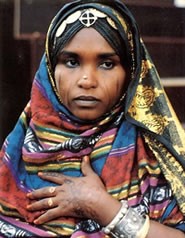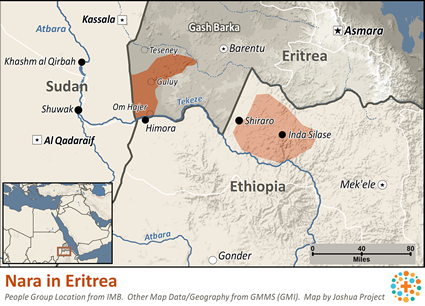Nara means “sky heaven.” The Nara live north of the Gash River in southwestern Eritrea. The Nara belong to the Prenilotes, the Sudanic peoples that migrated eastward into southwestern Ethiopia, introducing agriculture to that part of Africa. In the past, the Nara were one of the Sudanic tribes that were raided for slaves by other peoples.
The Nara language, also called Nara, belongs to the East Sudanic branch of the Nilo-Saharan language family. There is considerable dialect variation within their four main tribal sections and even from village to village. Tigre is used for intercommunication.
Ancient records exist referring to the Nara. Both an inscription in the fourth century and an Arab traveler's log in the ninth century document the location of the Nara on the borders of the Alwa Kingdom of the Nile Valley.
The Nara economy is based on subsistence agriculture, although many people weave, trade, hunt or breed animals to supplement their incomes. Their principal crops include sorghum, barley, wheat, millet, legumes, vegetables, fruits, sesame, linseed, tobacco and kat, a stimulant.
In the forests they gather vines to make ropes and baskets, as well as wood to make chairs and stools. Men do the hunting, herding, and milking; but both men and women participate in the farm work. They trade surplus crops and woven crafts for jewelry, spices and other things.
The Nara men practice polygyny, which means that they generally have multiple wives. The Nara require a substantial bride-price, which usually includes cattle and other valuables. The normal residential unit is an independent nuclear or polygynous family occupying a compound, within which each married woman lives in her own separate hut. Men eat with their sons while the women and small children eat separately.
The Nara community consists either of a single compact village or a cluster of small settlements. The people live in round huts made from an interweaving of rods and twigs overlaid with clay. The conical, thatched roofs extend down to the ground, making them look like beehives. The dwellings usually have two entrances. They are commonly clustered together in sites away from the main trails and in areas that can be readily defended from raiders.
Nara women are usually unveiled, have considerable liberty, and are treated with honor. The men usually wear brightly colored pieces of cloth that are similar to togas. Most men also wear turbans. They smoke tobacco, and, to some extent chew the stimulant kat. They drink liquor, even in public places.
Until the 1400s the Nara were animistic. Muslim missionaries from Egypt came and began the long process of converting them. Now the Nara are almost exclusively Muslim, having been converted during the late nineteenth century. Numerous elements from their old religion, however, still flourish on among them. Islam, in many cases, has failed to become internalized, possibly because of the way in which it was forced upon them.
Villages usually have a mosque, which looks much like the other houses. Many villages have imams, who teach the Koran. The Nara are not rigid in prayers or fasting, and few make pilgrimages to Mecca or other holy places. Moreover, few Nara, except those who are very religious, known in detail the Muslim proscriptions or the Koran; and most of them know little, if any, Arabic. However, they refuse to eat pork or the flesh of animals killed by someone of another religion.
The spiritual needs of the Nara are many. Few Christian resources in their language exist, though there is a Bible translation started.
Pray for a complete and accurate Bible for the Nara people of Eritrea.
Pray there will soon come a day when Nara disciples will make more disciples.
Ask the Holy Spirit to grant wisdom and favor to anyone reaching the Nara people for Christ.
Pray for the Lord to soften the hearts of the Nara so that they will be receptive to the gospel.
Ask the Lord to bring forth a strong and growing Nara church.
Scripture Prayers for the Nara, Nialetic in Eritrea.
https://thetribalsociety.com/the-nara-people/#:~:text=The%20Nara%20people%20are%20an%20ethnic%20group%20primarily,region%2C%20which%20lies%20near%20the%20border%20with%20Sudan.
https://www.101lasttribes.com/tribes/nara.html
| Profile Source: Joshua Project |

























